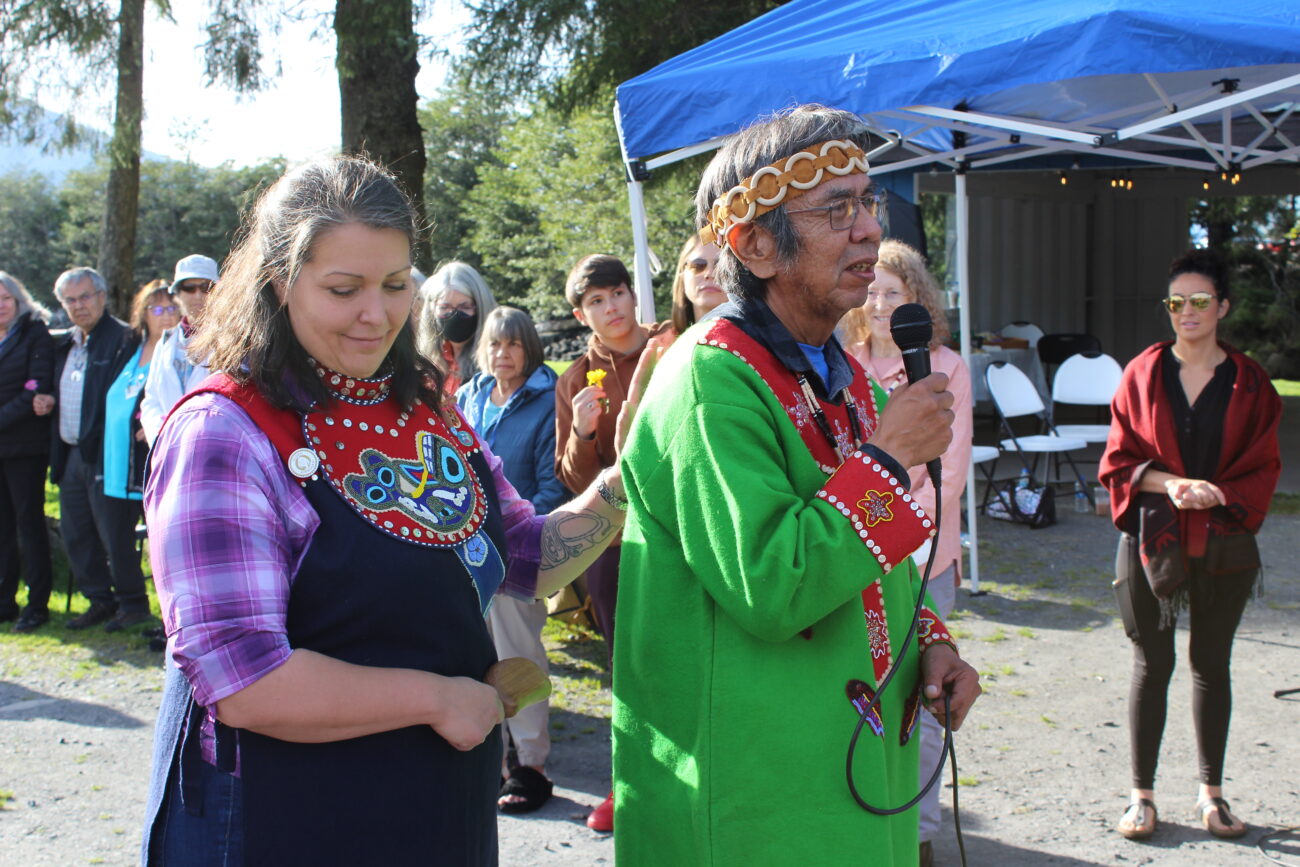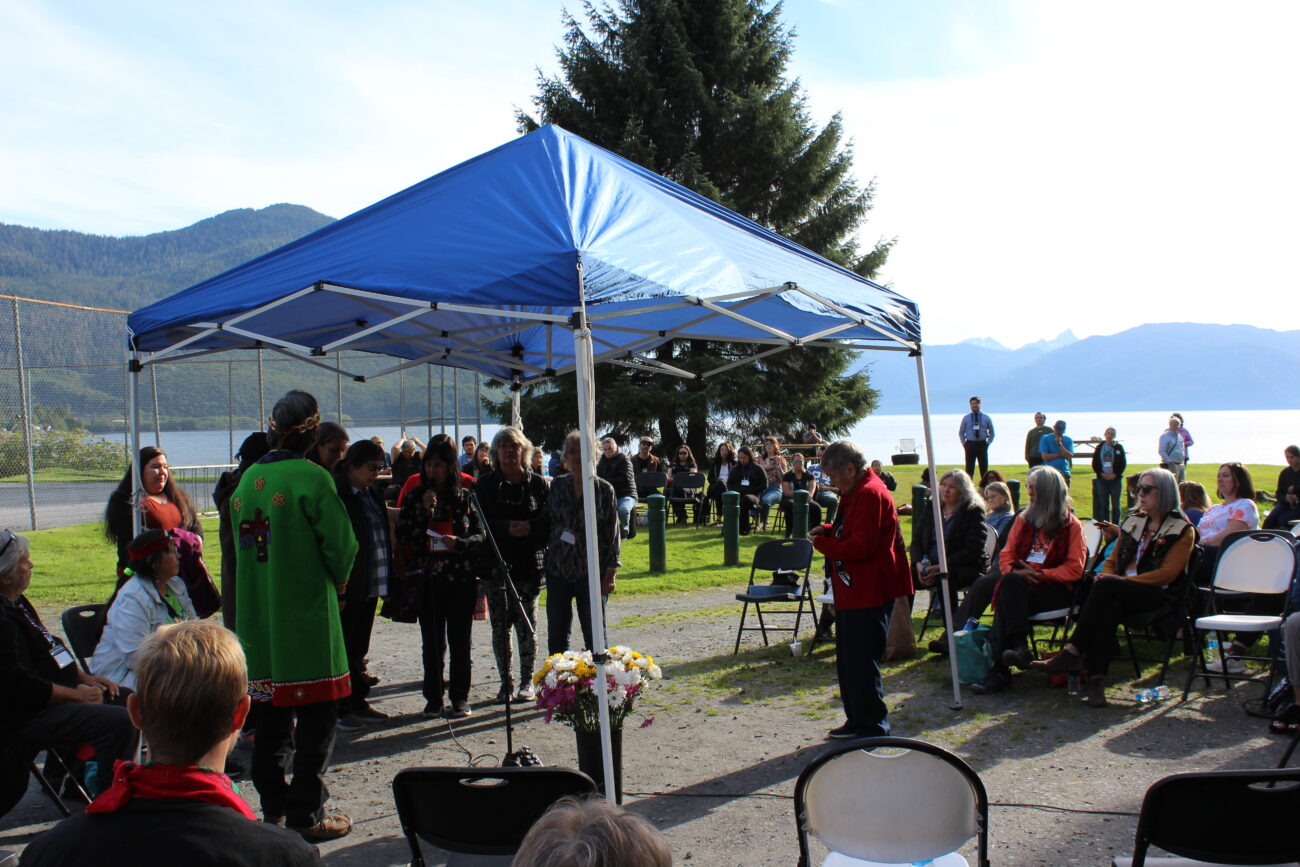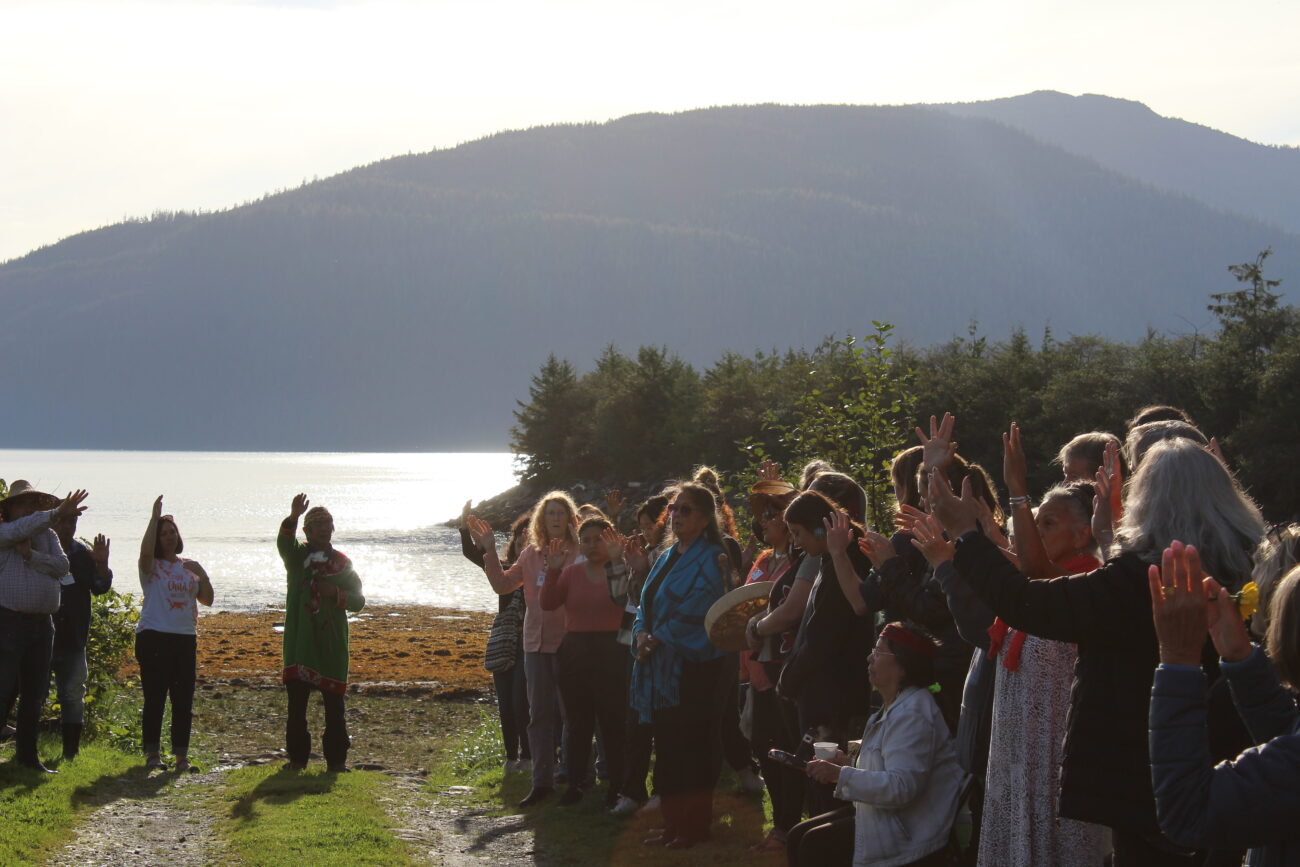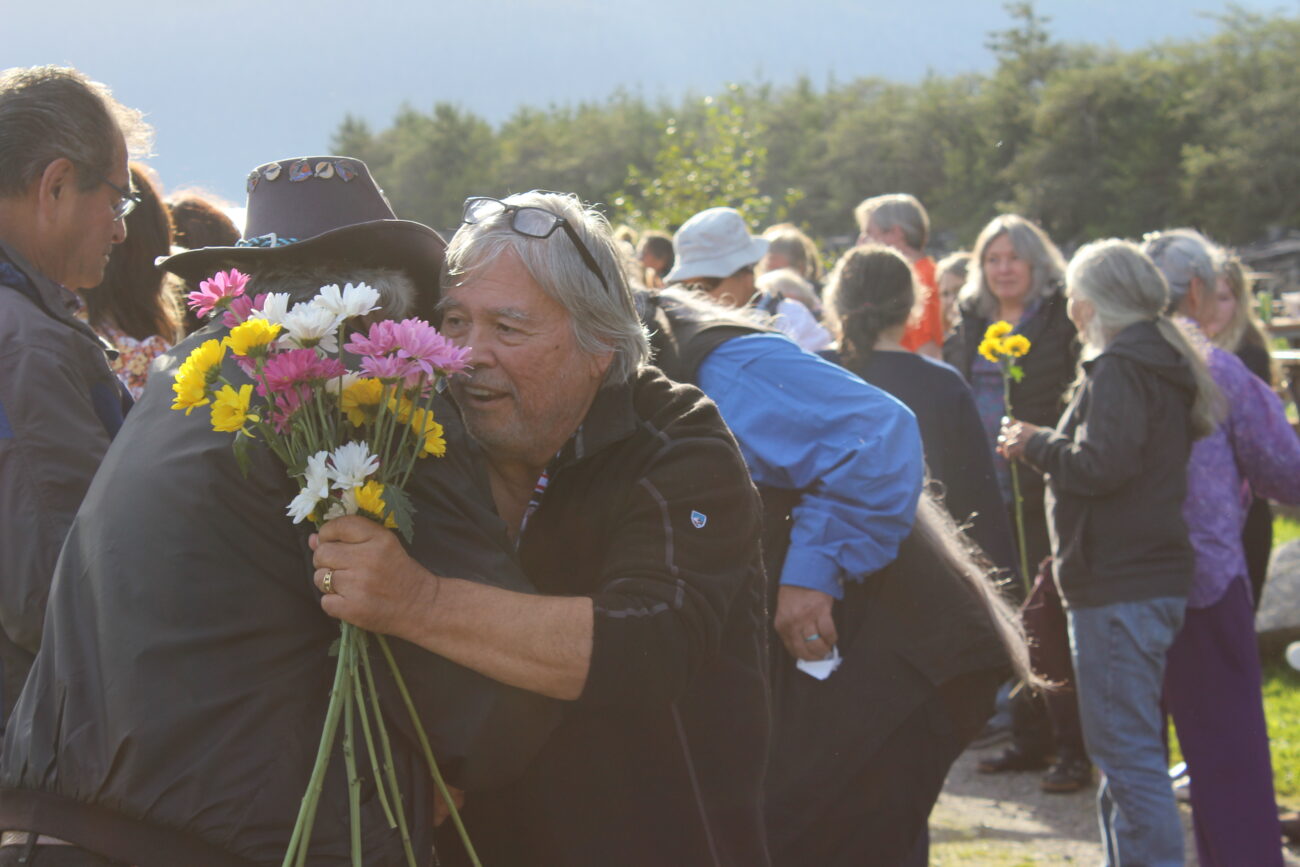
(Sage Smiley / KSTK)
Although the Wrangell Institute buildings were leveled more than a decade ago, the school’s memory looms large.
As the borough moves toward developing the site into housing lots, many who attended the former Bureau of Indian Education boarding school are still trying to cope with the trauma they experienced there – trauma that’s also impacted subsequent generations of Alaska Native people.
State records and other sources document intense physical, sexual and emotional abuse of Institute students. Survivors told KSTK in 2016 that they were beaten for speaking their Native languages.
And for those who worked at boarding schools, or whose family members did, it’s a heartbreaking and haunting legacy as well.
KSTK revisits a healing ceremony near the site that took place in September of 2022, as part of a regional Alaska Native clan conference, called Sharing our Knowledge.
A note for readers and listeners – this story contains details of physical abuse.
It was an achingly beautiful and surprisingly sunny fall day at Shoemaker Bay Park, about five miles south of downtown Wrangell. In many ways, it didn’t look like the site of a former Bureau of Indian Education boarding school.
Institute Creek burbled past rows of folding chairs on the grassy lawn. In the park’s covered shelter, logs crackled and burned in the fireplace.
Dozens of people – some wearing beaded regalia or woven cedar hats – gathered around a blue pop-up tent. The mood was contemplative.
Former Alaska Native Sisterhood Grand President Freda Westman gave a prayer of invocation, standing with her sister Barbara Searls and friend Joaqlin Estus.

(Sage Smiley / KSTK)
“Dear Creator God, thank you for this time together,” Westman prayed. “Please protect us in this moment, please lend your arms around us. Hold us up with your strength and help us do this for each other. Help us remember those affected by this place. Bring back your presence here.”
Across the highway, the former site of the Wrangell Institute buildings was overgrown with alders. Wrangell’s Lingít clans and tribal government, the Wrangell Cooperative Association, hosted the healing ceremony.
“Eesháan x̲at, we’re sorry for what happened to you on this land,” said Luella Knapp, of Wrangell’s Naanya.aayí clan. “As children, we didn’t know what was happening. And we grew up here. We also suffered.”
Knapp gave some background to the site: “This was Naanya.aayí’s first settlement when they came down, back down [the Stikine River]. It was called Keishangita.’aan. And today we are here, all of us, for healing.”
Joaqlin Estus is also Lingít from Wrangell, a descendant of civil rights leader Tillie Paul Tamaree.
“My mother was a matron at Wrangell Institute, and I know several other people here had relatives who worked at the Institute, and I’m so sorry,” Estus said. “I like to think that she was – I like to think that everybody I knew that worked there was a good person. Now, I know that’s not true.”
Estus said that over the years, she’s encountered some of her mother’s students.
“Many girls have come up to me and said ‘I knew your mom. She was strict but fair, and I really liked her,’ and so that helps,” Estus said. “[…] I went to St. Paul and a man came up to me with this big smile on his face. He said: ‘I hated your mother.’ And it was like getting stabbed. I mean I just – well first he said, ‘Are you Mrs. Estus’s daughter?’ and that was my first clue that it was probably somebody from the Institute. And then he said, ‘I hated your mother,’ and I went ‘What?’ and he said: ‘She was the dog guarding the henhouse and I was the fox trying to get in,’ because she worked in the girls’ dorm.”
The assembled crowd burst out with laughter.
Lingít storyteller Shaagunastaa Bob Sam led the healing ceremony.
“I’m wearing my regalia because they were taken away from us,” Sam said. “I wanted to wear my regalia on this land of Wrangell Institute so that we could show that we are living people that we still know who we are. We know our culture. We know the clans here. And we know our language. Our customs – they’re still with us.”
Sam said he worked as a dorm attendant at another boarding school, Mt. Edgecumbe, in Sitka. He said he thinks of himself as a good staff member but he saw things at the school that concerned him.
“I’m going to ask something that’s going to be the hardest thing to do,” Sam said to the crowd. “I’m going to ask you to forgive me. Please forgive the staff. And also hold them up. We have to forgive. It’s so important to forgive. Because once we forgive, we become true human beings.”

(Sage Smiley / KSTK)
Jim LaBelle, whose Inupiaq name is Aqpayuq, spent six years at the Wrangell Institute in the late 1950s and early 1960s. He’s spoken out repeatedly about the abuse he endured at the school.
One horrifying experience LaBelle describes in a letter to a U.S. House committee hearing on H.R. 5444, Truth and Healing Commission on Indian Boarding School Policies Act. It details a punishment for speaking Alaska Native languages, known as “The Gauntlet”.
He wrote: “For those that were deemed uncompliant for speaking their own language, they had to “run the gauntlet. It became a spectator sport. Little five and six year old’s had to disrobe in front of other children who were ordered to hit those running the gauntlet with belts, and as hard as they could, otherwise they were next. When I was forced to run down the line, it was never a single run, it was often two or three times.”
That image stuck with Bob Sam.
“I want to ask you to form these two lines again,” Sam asked, “So that those of us who experienced that [can] walk through the two lines, in the middle, with people holding flowers. We will walk towards the light towards the sun – Wrangell Institute is behind us.”
The setting sun shone directly down the middle of the two lines of people.
“We’re going to walk away from the school,” Sam said. “And the sun is in a perfect place. It’s perfect. We’re going to walk into the light. It is such a beautiful day – and that’s rare in Southeast Alaska. So it’s like the Creator prepared itself for us, and brought the sun out.”
LaBelle stood alone at the end of the lines.
“At this solemn occasion, I am so grateful for the weather,” he said, “because I get to wear my clothes this time.”
Sam, who began a slow chant, called out: “Shake his hand. Welcome him home. He’s been waiting for this.”

(Sage Smiley / KSTK)
In the two parallel lines from the park to the water, healing ceremony attendees held daisies of pink, yellow, and white. LaBelle, and then others, slowly walked down the lines of people toward the ocean, shaking hands, giving hugs, collecting flowers.
Attendees called out support:
“I admire your strength.”
“You’re a good man, you’re an honorable parent!”
“You did the right thing, I’m so glad you told.”
“You give me courage.”
“You give me strength.”
“X’éig̲aa áwé, it’s the truth!”
“I gu.aa yáx̱ xʼwán!”
Few eyes were dry, and LaBelle was visibly moved.
Clan members from Yéil (Raven) and Ch’áak’ / G̲ooch (Eagle / Wolf) Lingít moieties both shared songs, a part of the ancient culture of balance and reciprocity. The last song was an exit song – sung at the end of an event, the end of a life, the end of an era.
As the crowd dispersed, laughter floated from groups chatting across the park. The weight of the Wrangell Institute’s legacy is not gone, but it had been lifted, just a little.
While housing development continues, Wrangell’s tribal and borough governments are working on plans to place a memorial at the former Institute site, honoring the experiences of Alaska Native students from across the state who spent time there.
Get in touch with KSTK at news@kstk.org or (907) 874-2345.













